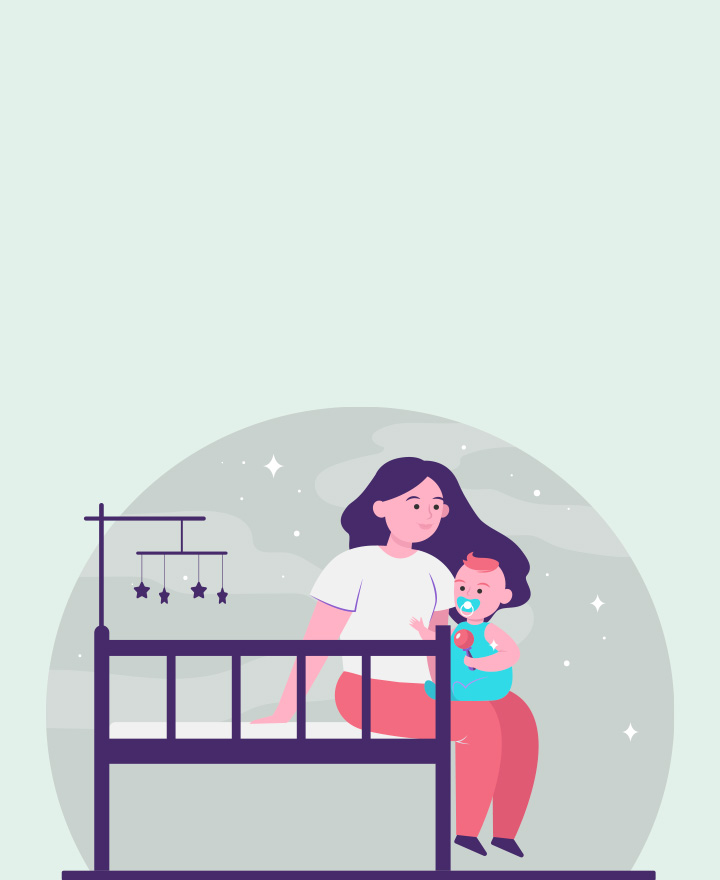

Bedwetting (Nocturnal Enuresis) – Causes, Treatment, and Home Remedies
Bedwetting, medically known as nocturnal enuresis, is quite common in kids aged less than 5 years. They pee involuntarily during sleep in this condition. Parents and kids are quite embarrassed about this condition, but please remember that most kids outgrow it when they turn 7 years old. Some kids with underlying health conditions or genetic causes may have bedwetting issues even beyond 7 years of age. Read on to learn the causes and treatment options available for this condition.
Causes of Bedwetting in children
• Late development of bladder
In some children, the bladder, nervous system, and brain may not develop on time, causing bedwetting issues even when they are more than 7 years old.
• Deep sleep
Sometimes, your child may be enjoying a deep sleep. So, he/she doesn’t comprehend the signals sent by the brain to pee in the bathroom. However, in most cases, bedwetting in children beyond 5 to 7 years doesn’t happen only because of deep sleep.
• High urine production
Due to an existing ailment, your child’s body may produce urine excessively at night. Usually, the antidiuretic hormone works on controlling urine production; however, in this case, especially if your child is diabetic, this hormone may not function properly.
• Stress/distractions
If your child is under stress or is extremely disturbed by something, it may cause him/her to involuntarily wet the bed at night. Watch out for mental health disorder symptoms in your child.
• Improper bathroom routines
Teach good bathroom manners to your child right from the time he/she goes to pre-primary school. Your child should be taught never to control urine and always use the bathroom for peeing. Some children control their urine during the day because of various reasons (school work, playtime, etc.), which results in bedwetting at night.
• Urinary Tract Infection
Kids with narrow urinary tract (urethra) issues or infections in their kidneys and bladders may tend to pee on their beds, as they don’t have any control over their urination.
• Constipation
Watch out for your child’s stool habit. If he/she complains about pain or discomfort while passing stool, you should take your child to a doctor immediately. Children with constipation may have bedwetting issues.
• Spina Bifida
This refers to genetic defects in a baby. Babies born with spinal and nerve damage are more prone to bedwetting than normal kids.
• Sleep Apnoea Issues
Obstructive sleep apnoea is a condition when your kid stops breathing during sleep because of blockages in his/her windpipe. This causes your child to have a disturbed sleep, which is why bedwetting happens without his/her knowledge.
• Attention-Deficit/Hyperactivity Disorder
ADHD is a mental health issue which affects a kid’s ability to focus on anything for more than a few minutes. Such kids are very impulsive and hyperactive, and they don’t have control over their physical movements. This may lead to bedwetting in children.
Treatment
Here are some bed-wetting treatment methodologies to stop this habit in kids. However, please remember that most kids grow out of this habit when they are around 7 years old.
• Ensure your kid goes to the bathroom before going to bed. Make urinating before sleeping a daily routine in your child’s life to limit bedwetting instances.
• Keep your kid as far as possible from sugary drinks, like colas, drinks with caffeine, sodas, citrus juices, etc., especially at night.
• Treat constipation immediately, as it is one of the common culprits of bedwetting in children.
• Be patient with your kid when he/she has bedwetting issues. If you lose your cool, it can cause additional stress in the child.
• Investing in a moisture alarm is a good idea. It goes off when your kid wets the bed, thereby disturbing his/her sleep. This stimulates the brain to send signals to the kid at the right time so that he/she is tuned to go to the bathroom to pee.
Home remedies to help your kid stop bedwetting
If you are looking for answers to the question, “How to stop bed wetting in children?” here are a few effective home remedies —
• Pelvic muscle strengthening
Place a small ball between your child’s thighs and ask him/her to hold that position for a few seconds. Repeat this regularly to increase the strength of his/her pelvic muscles.
• Cranberry juice
Rich in antioxidants, cranberry juice helps to keep urinary tract infections at bay, by keeping your child well-hydrated.
• Nuts
Walnuts and raisins, especially, are excellent sources of good fats and magnesium, which promote the functioning of the urinary system in kids.
Conclusion
Knowing the causes of bedwetting in children is extremely important, as it helps you correct the fundamental reason for the issue. Introducing proper bathroom routines and taking care of their diet can reduce the instances of bedwetting in kids. However, seeking medical help is essential when you don’t see this condition improving. Also, purchase a comprehensive health insurance policy to safeguard the well-being of all household members so you can seek timely medical attention without thinking about how to tide over the financial burden.
One of the important components of our overall wellness is also being financially secured. Healthcare emergencies can happen any time, but a good health insurance policy can protect you from such uncertain situations. To know more about Wellness and other health related tips, visit the wellness corner.
Source: acko, my.clevelandclinic
Disclaimer: This blog provides general information and discussions about health and related subjects. The information and other content provided in this blog, website or any linked materials are not intended and should not be considered or used as a substitute for medical advice, diagnosis, or treatment. Kindly contact your doctor before starting a new medicine or health regime.
Related Articles
ADHD : Attention-Deficit Hyperactivity Disorder in Children
Published on April 24, 2025















 Health Insurance
Health Insurance  Travel Insurance
Travel Insurance  Car Insurance
Car Insurance  Cyber Insurance
Cyber Insurance  Critical Illness Insurance
Critical Illness Insurance
 Pet Insurance
Pet Insurance
 Bike/Two Wheeler Insurance
Bike/Two Wheeler Insurance  Home Insurance
Home Insurance  Third Party Vehicle Ins.
Third Party Vehicle Ins.  Tractor Insurance
Tractor Insurance  Goods Carrying Vehicle Ins.
Goods Carrying Vehicle Ins.  Passenger Carrying Vehicle Ins.
Passenger Carrying Vehicle Ins.  Compulsory Personal Accident Insurance
Compulsory Personal Accident Insurance  Travel Insurance
Travel Insurance  Rural
Rural